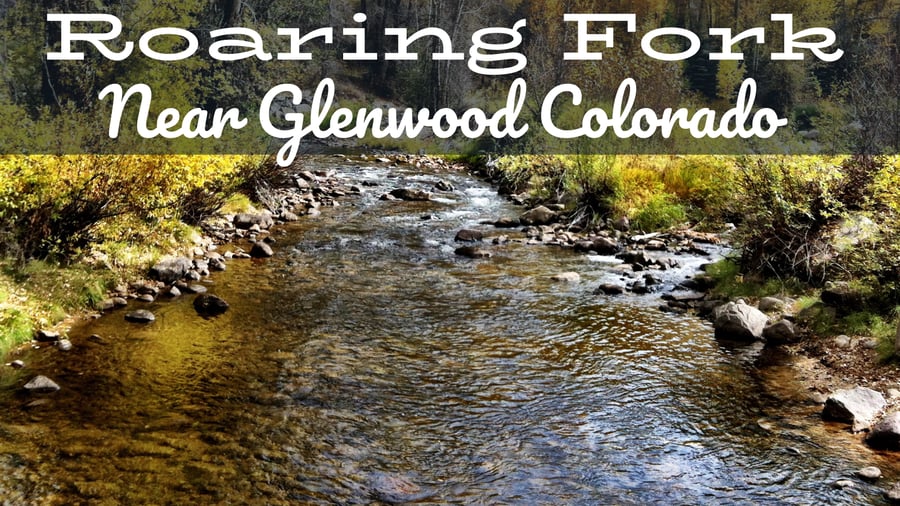
Updated: 12/04/2025
The Fork near Glenwood is in true shoulder-to-winter mode, with steady mid-range flows and improving clarity after last week’s slight bump. Week over week, trout have shifted deeper as overnight lows dip, pushing fish into slower edges and the softer guts of long runs. Midges now dominate the drift, but small baetis emergers still produce during cloudy afternoons. This stretch warms faster than the upper Fork, giving anglers a longer feeding window. Expect productive nymphing and the occasional streamer grab when shadows extend across the banks.
Listen to the Audio Overview
Conditions Summary
%20(4).png?width=800&height=175&name=Guide%20Rating%20(800%20x%20175%20px)%20(4).png)
Flow: Moderate and stable
Water Temp: Mid 30s to low 40s
Air Temp: Low 40s
Clarity: Clear
Crowds: Light
Best Window: 11 am to 3 pm
Fishing Type Focus: Nymphing, because fish are concentrated in deeper mid-river trenches and respond best to tiny midges presented slow and low.
Weather
Cold but not brutal. Expect crisp mornings, periods of cloud-filtered warmth, and quick temperature dips once canyon shadows creep in.
Top Flies in Your Box This Week
- Black Beauty 20–22
- Zebra Midge Black or Red 20–22
- Mercury Midge 22
- RS2 Gray 20–22
- WD40 Chocolate 20–22
- Sparkle Wing Baetis 20
- JuJu Midge Purple 20–22
- Shot Glass Baetis 20
- Thin Mint Leech 10
- Mini Leech Black 12
Pro Rig of the Week
Glenwood Winter Two-Tone Midge Rig
Leader: 9–10 ft 4x to 5x fluoro
Top Fly: Zebra Midge Red 20
Dropper: RS2 Gray 22
Indicator: Small airlock for long drifts
Weight: One small split shot placed lightly above the knot
Target Water: Deep center lanes, slow shelves adjacent to bigger riffles, and long, even glides with obvious winter troughs
Hatch Chart for December
| Hatch Type | Bugs You’ll See | Notes |
|---|---|---|
| Primary | Midges 20–26 | Best on cloudy mid-days |
| Secondary | Baetis 20–22 | Hatches weaken but still relevant |
| Tertiary | Winter Stone Nymphs | Subsurface only |
Download the Roaring Fork Hatch Chart
Access Points
Two Rivers Park Access
Broad water near town with easy wading and dependable winter holding slots.
Rating: ⭐⭐⭐⭐
Veltus Park Access
Slower seams and long, fishy glides perfect for delicate winter drifts.
Rating: ⭐⭐⭐
I-70 Pull-Offs (Between Glenwood & Carbondale)
Light pressure, plenty of structure, and classic Fork pocketwater turned winter soft-water.
Rating: ⭐⭐⭐⭐
No Name Area Access
Mixed depth and hidden pockets, icy mornings but excellent clarity.
Rating: ⭐⭐⭐
Stop Here After the River
Skip the busiest taprooms and head to Carbondale Beer Works. It is relaxed local and never pretentious. The crowd is a mix of river guides climbers and valley regulars. Grab a Colorado Kolsch and the green chile pork sandwich. It is one of the best warm up meals you can get after a cold day working deep seams on the Fork.
Local Regulations & Notes
Watch for rapidly forming shelf ice
Flows remain fairly steady
Visibility can shift quickly after storms
FAQ
Q: Can the Fork still produce on streamers in winter?
A: Yes, but only smaller leeches fished slow and deep.
Q: Is this stretch beginner friendly?
A: Yes, more forgiving than the upper Fork.
Q: How long is the feeding window?
A: Often 2–3 hours mid-day, depending on cloud cover.
Q: Is the water crowded?
A: Very light pressure right now.
Q: What tippet is best?
A: 5x fluoro for nymph rigs.
Q: Do fish hold close to the bank?
A: Midday yes, especially where sunlight warms softer water.
Recommended Companion Article
Colorado Winter Trout Feeding Behavior in Clear, Low-Flow Rivers
.png?width=300&height=100&name=Copy%20of%20Rise%20Beyond%20Logo%2012.31.24%20(300%20x%20100%20px).png)
.png)
